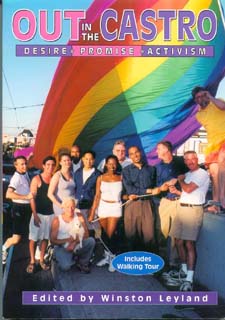 |
|
Desire, Promise, Activism Out in the Castro: Desire, Promise, Activism; Edited by Winston Leyland; Leyland Publications, 352 pages; $24.95. [This book can be purchased by mail directly from the publisher. Send check or money order for $26.95 postpaid to Leyland Publications, PO Box 410690, San Francisco, CA 94141. California residents add 8% sales tax.]  The Castro is America's most famous gay neighborhood. Castro historian Susan Stryker called the former Eureka Valley District of San Francisco "the symbolic main street of the city's queer community and an emblem of gay pride around the world".
The Castro is America's most famous gay neighborhood. Castro historian Susan Stryker called the former Eureka Valley District of San Francisco "the symbolic main street of the city's queer community and an emblem of gay pride around the world".
"Say the words [The Castro] to a LGBTQ person almost anywhere in the world, and she or he will more likely than not respond to a wide smile of recognition," said Winston Leyland, long-time Castro resident and editor/publisher of Gay Sunshine Journal, Gay Sunshine Press and Leyland Publications. "During three decades this most famous of queer neighborhoods has become for our own community synonymous with liberation, freedom, celebration, and a bete-noir for our opponents of the fascist, extremist right who demonize it to fit their own dark and obsessive fantasies." When I first visited The Castro in 1991, it was like a pilgrimage: This was our Jerusalem and our Mecca. The Rev. Jim Mitulski, former pastor of the Metropolitan Community Church of San Francisco, said it all when he called The Castro "a sacred place." Though there have been memoirs of The Castro, by N. A. Diaman, Dan Vojir and others, there has never been one book that captured the spirit and variety of this neighborhood. Happily this worthy goal was accomplished with the publication of Out in The Castro: Desire, Promise, Activism. "Out in The Castro is not a history of LGBTQ San Francisco as a whole," cautioned Leyland, the editor of this anthology. "Rather, the focus is on historical (and present day) events, activism and personalities directly associated with The Castro". Though not "a definitive history of The Castro", Out in The Castro is the best book ever written about this gay neighborhood (or, for that matter, any gay neighborhood); and the next-best thing to being there. I only regret the lack of a bibliography, an invaluable resource for those of us who like to read further. To many people, The Castro is synonymous with the late Harvey Milk, "the Mayor of Castro Street". Out in The Castro gives Milk his due, with essays by Milk associates Anne Kronenberg, Frank M. Robinson and Harry Britt. But there was more to The Castro in its Golden Age (the 1970's) than its first openly-gay supervisor. In Out in The Castro, singer/songwriter Blackberri remembers Andy's Doughnuts, the "center of the universe". Journalist/scholar Katie Szymanski (who also contributed a "walking tour" of The Castro) pays homage to Twin Peaks bar - "at the corner of history and tomorrow" - and her employer Bob Ross, publisher of the Bay Area Reporter (1971-).
Like too many other neighborhoods, The Castro has suffered from gentrification, rising prices, and a selfish disregard for those who are less fortunate. "The Castro has become a few blocks of expensive T-shirt and clothing shops, juice bars, yuppie eatery chains, and trendy neighborhood shopping and dining," complains author/performer Justin Chin, who adds that "The Castro is actually a very boring place." "When did the Castro change from a little small gay town to something else?," asked Rev. Mitulski. "When did the fabric of community weaken, tear, and fray? It is still a symbol of our liberation movement, but it changed, as cities do, and in ways that leave me sad and wondering. When did all the apartments become condos? Was it while we were tending our sick? When did our compassion for AIDS turn to animosity against the homeless?" Bruce Mirken's essay about the "young and homeless in The Castro" is a sad reminder that we are often our own worst enemies. Is this "the end of the dream"? As Leyland put it, "Time will tell whether The Castro becomes a gay Disneylandesque playground with power in the hands of uncaring 'my quality of lifers' (no homeless people or queer youth centers wanted), or whether the compassion/activism of the past take fresh root." Certainly Tom Ammiano's campaigns for supervisor and mayor prove that the gay spirit is still alive and well and living in The Castro. As author/activist Tommi Avicolli-Mecca put it, "Despite the changes, Castro remains an enduring symbol of queer liberation, an oasis for those fleeing from oppression. ... Perhaps the Ammiano campaign proved that it won't succumb totally to the forces of profit and nimbyism. Perhaps that campaign showed that beneath the surface a heart and soul still rages with a yearning for economic and social justice. ... As long as that heart beats, there will always be a Castro." To which I can only say, amen. |

